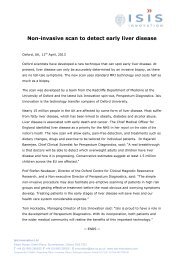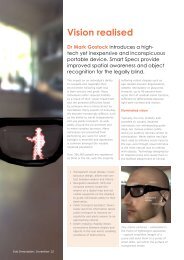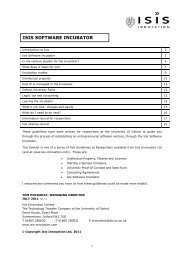Using the Oceans as a Carbon SinkArranging consultancy work through Oxford University ConsultingCquestrate is developing a ‘carbon negative’ process – one that reduces the concentration of carbondioxide in the atmosphere. Unlike most ideas, which aim to tackle climate change it does not reduceemissions, but rather removes emissions after they have been produced. If performed on a largeenough scale it could reduce the level of carbon dioxide in the atmosphere to pre-industrial levels.The process enhances the capacity of the oceans to act as acarbon sink by adding calcium hydroxide to seawater, whereit reacts with carbon dioxide already dissolved in the oceansto form calcium bicarbonate, which remains in solution. Thishas two effects: it allows the oceans to absorb more carbondioxide from the atmosphere and it raises the pH of theocean, thereby mitigating ocean acidification.Cquestrate has received funding from Shell to investigatethe proposed process and turned to a team led byProfessor Gideon Henderson at the Department of EarthSciences at Oxford University to write a report on theenvironmental consequences on the ocean of undertakingthe process on a scale sufficient to stabilise atmosphericcarbon dioxide levels.The report concluded that “Overall, there appears to beno serious flaw in the Cquestrate scheme from an oceanperspective”, but that further work is required to assess theworkability and impact of the process.Cquestrate is developing the process in an open-source way,so full details of the process and the report can be found ontheir website www.cquestrate.com.Oxford University Consulting drew up the contract betweenCquestrate and the authors of the report, which reflectedthe open-source nature of the project and ensured that anyintellectual property generated was made available in thepublic domain so as to preclude anyone obtaining patents thatcould be used to hamper the development of the process.If performed on a largeenough scale Cquestrate’s‘carbon negative’ processcould reduce the carbondioxide in the atmosphere topre-industrial levelscontactGurinder PunnProject Manager,Oxford University ConsultingT 01865 280826E gurinder.punn@isis.ox.ac.ukTim Krugerwww.cquestrate.comProfessor Gideon Hendersongideon.henderson@earth.ox.ac.uk16
BIOMedical Imaging at OxfordA community of researchers and practitionersA wide network of biomedical imaging researchers from the University of Oxford and the OxfordRadcliffe Hospitals NHS Trust provides a unique source of expertise and innovation.2008 Oxford Imaging FestivalThe 2008 Oxford Imaging Festival was held on September16th at St John’s College. This annual one-day festival ofimaging aims to share the breadth of imaging expertiseand knowledge within the Oxford imaging community. Thisyear’s event brought together many of Oxford’s imagingscientists and clinicians, showcasing their broad expertiseand the range of scientific research being undertaken inOxford. It provided an excellent opportunity for networkingbetween University researchers, NHS clinicians and industrialscientists. The event comprised a series of scientific lectures,a dedicated poster display and information stands from arange of industrial and other event sponsors.The scientific lectures and posters covered a wide expanseof imaging science ranging across modalities and includedboth basic and clinical science applications, includingcardiovascular ultrasound techniques and functional MRIneuroimaging. Some lectures concerned the application ofmodalities in combination. For example, Dr Fergus Gleesonof the Churchill Hospital, Oxford Radcliffe Hospitals NHSTrust, explored dynamic contrast enhanced MRI (DCE-MRI)and dynamic PET in rectal cancer, and lung imaging usinghyperpolarised helium.Oxford Biomedical Imaging NetworkThe festival is organised by the Oxford Biomedical ImagingNetwork, established in 2007 with a grant from the JohnFell OUP Research Fund, to provide a forum for improvedcommunication and collaboration between the diversemembers of the Oxford University ‘imaging community’.The network comprises experts working across the imagingscales (cellular microscopy to human whole body imaging),modalities (optical microscopes, nuclear medicine imagingtechniques, magnetic resonance imaging, ultrasound, contrastagent chemistry), and disease areas (oncology, clinicalneuroscience, cardiovascular medicine and musculoskeletal).This year’s festival attracted a wide variety of commercial andindustrial sponsors, including <strong>Isis</strong> and OIS member SiemensHealthcare. The Network is led by Professor Peter Jezzard(Dept. of Clinical Neurology), and if you would like to obtainfurther information on its activities, or to express an interestin becoming part of the Network, then please contactimaging_network@fmrib.ox.ac.uk.Expertise and innovation opportunities<strong>Isis</strong> representatives from both its Technology Transfer andOxford University Consulting (OUC) business lines attendedthe festival, as it provided an ideal opportunity to meet witha wide range of internal and external customers. Comprisingover 100 researchers involved in imaging related researchtopics, including molecular, pre-clinical and human imaging,the Network provides a unique source of specialist expertise.It is also offers an excellent source of technology licensingopportunities. To mention just one such opportunity, DrOlivier Noterdaeme (recent Oxford DPhil graduate in theDept. of Engineering Science), working in the field of highintensity focused ultrasound and contrast enhanced MRI,has developed software to improve the image informationcontent of MRI (enhanced and non-enhanced) data.It is planned for the next festival to be held in September2009, although other scientifically focused workshops willalso take place in the interim.contactSteve LeeDr Mike GilbertHead of GroupProject ManagerOxford University Consulting Technology Transfer GroupT 01865 280824T 01865 280919E steve.lee@isis.ox.ac.uk E michael.gilbert@isis.ox.ac.ukW www.isis-innovation.com W www.isis-innovation.com17
















